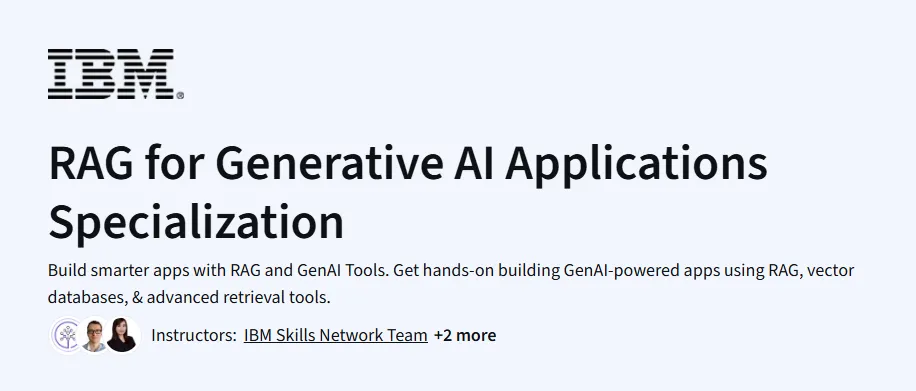What will you learn in RAG for Generative AI Applications Specialization Course
Build job-ready skills to create Generative AI applications using Retrieval-Augmented Generation (RAG) techniques.
Use advanced RAG frameworks like LangChain and LlamaIndex to enhance response quality.
Leverage vector databases such as FAISS and Chroma DB for efficient semantic search and recommendation systems.
Design and deploy complete RAG-enabled apps with Python, Gradio, and popular LLMs (e.g., IBM Granite, Llama, GPT).
Program Overview
Course 1: Develop Generative AI Applications: Get Started
⏳ 8 hours
Topics: Generative AI fundamentals, LangChain prompt templates, Flask integration, model selection.
Hands-on: Build a Flask-based GenAI web app with structured JSON outputs using LangChain.
Course 2: Build RAG Applications: Get Started
⏳ 6 hours
Topics: RAG architecture, Gradio interfaces, LangChain vs. LlamaIndex comparisons.
Hands-on: Implement RAG workflows in Python, integrating LangChain and LlamaIndex for document QA.
Course 3: Vector Databases for RAG: An Introduction
⏳ 9 hours
Topics: Vector vs. relational databases, ChromaDB operations, similarity search, recommendation systems.
Hands-on: Execute similarity searches and build a recommendation system using ChromaDB.
Course 4: Advanced RAG with Vector Databases and Retrievers
⏳ 1 hour
Topics: Retrieval patterns, advanced FAISS retrievers, end-to-end RAG app design with Gradio.
Hands-on: Optimize retrieval strategies in FAISS and assemble a full RAG application with UI.
Get certificate
Job Outlook
Companies are seeking AI Engineers and ML Engineers who can integrate RAG to build context-aware GenAI solutions.
Roles such as RAG Specialist, AI Application Developer, and Data Engineer (GenAI) offer salaries typically in the $100K–$150K range.
Expertise in RAG frameworks, vector databases, and LLM orchestration is highly valued in tech, finance, and enterprise AI teams.
Specification: RAG for Generative AI Applications Specialization Course
|





